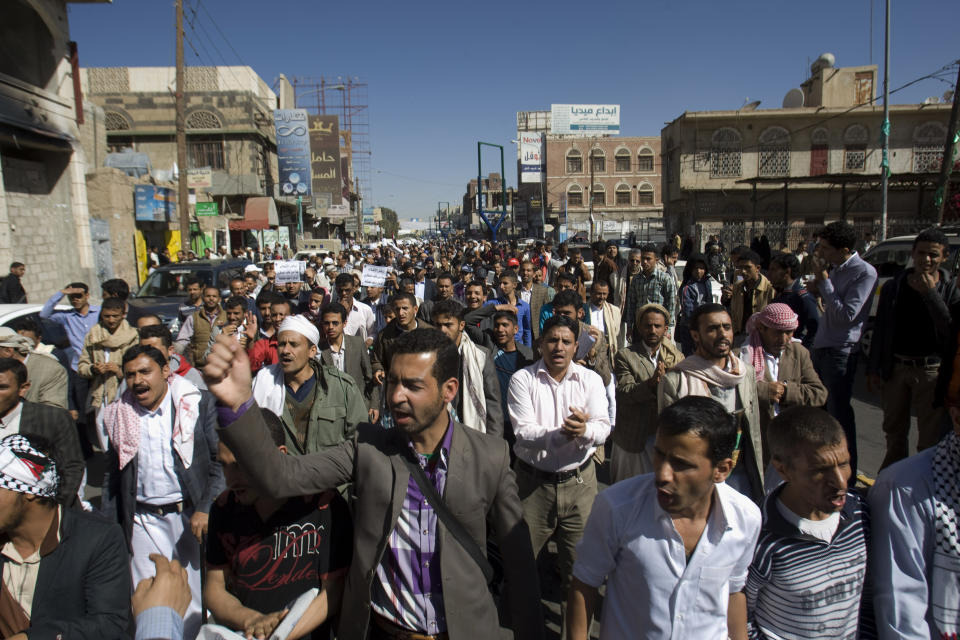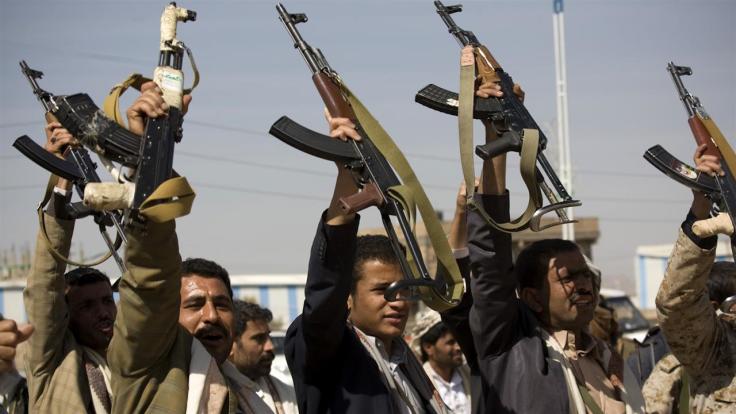According to Plan A
"Hadi was extraordinarily important. He made it easy to co-operate with Yemeni military and intelligence. His loss is a major loss."
"[The] upheaval will make it more and more difficult to get intelligence."
Bill Roggio, managing editor, Long War Journal
 |
| Photo, Hani Mohamad, In this Saturday, January 26 photo, Protesters chant slogans against Yemeni Houthi rebels who hold the capital city hostage to their political demands. |
Washington, in light of the serious set-backs to security and government stability in Yemen, has resolved to carry on its fight against al-Qaeda. A U.S. drone strike sent a missile toward an al-Qaeda stronghold in central Yemen yesterday, killing a number of its fighters, Yemeni and Saudi. The strike was confirmed by Yemeni tribal and security officials.
There's not too much comfort to be taken by that single strike and its mild success in extinguishing a handful of jihadists. A U.S. backed ground strategy against the terrorist group has had its legs kicked out from under by the disintegration of the armed forces of the country which have received millions in U.S. military aid. A situation reflective of the aid and military training support lavished on any number of Arab and Muslim countries, to little avail.
From Afghanistan to Iraq, Libya to Yemen, the United States has ransacked its treasury to shore up the defensive strategies of countries in the Middle East to aid them in their struggle against fundamentalist Islamist terrorists with little of benefit to show for it. Egypt is certainly nor representative of that typical failure, and nor is Saudi Arabia, yet.
 |
| Shiite Houthi rebels seized the presidential palace in San'a on Tuesday following the collapse of a ceasefire. The presence of the president is unknown. Photo: AP |
Looming above all the most recent restiveness in the Middle East is the Islamic Republic of Iran, burnishing its credentials as the new authoritative leader in the region, having established a crescent of Shiite-majority or -threatening movements allied with Iran and its track toward ultimate power. The Hezbollah, Syria, Iran trifecta has been joined now by Yemen with its minority Shiite Houthis backed by Iran, turning Yemen away from the West and toward Iran's power struggle with the Gulf States.
Might Bahrain be next, with its minority Shias taking power? With the aid of Iran, of course. An Iran whose threat would be multiplied with the ascendance of its status as a nuclear power, that is. Syria, ruled by a minority Shiite Alawite government, has laid waste to the country, creating millions of majority Sunni refugees. Lebanon's Party of God, another minority group, has bulldozed its terrorist militias into quasi-legitimacy as part of the government.
And Yemen, battling al-Qaeda in the Arabian Peninsula as a regional partner with the United States, the original home of the bin Laden family, has now seen its minority Houthi Shiites dismantle the majority Sunni government of U.S.-backed President Abed Rabbo Mansour Hadi; his cabinet resigning in denying demands by the Houthi rebels for increased power.
The Middle East once again resigned to its implacable hatreds; Sunni against Shiite, launching conflicts and shift-shaping allegiances, showering the sands of the region with the blood of Muslims who just happen to be considered by one side or the other apostates, finding a common mission of transitory solidarity in only one instance, the labelling of the State of Israel as their common enemy whom they pledge to destroy.
Saudi Arabia once again finds itself in an agony of self-doubt, that its efforts to establish itself as Yemen's most trusted neighbour has been forestalled with the reality of Iran's proxy Houthi tribes destabilizing the country, creating new concerns of allegiances inimical to Saudi Arabia's status as the senior commanding nation of the Arab/Muslim Middle East.
A position, of course, that other Sunni-majority countries in the geography would be happy to line up for as candidates; Egypt and Turkey, for example.
Labels: Al-Qaeda, Conflict, Iran, Saudi Arabia, United States, Yemen

<< Home